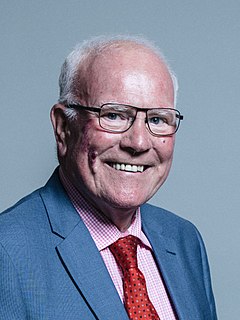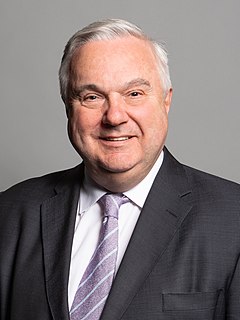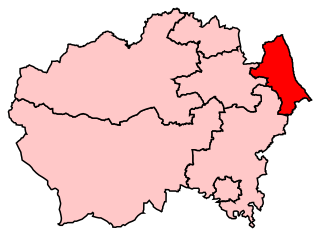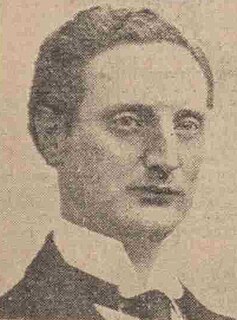The miners' strike of 1984–1985 was a major industrial action within the British coal industry in an attempt to prevent colliery closures. It was led by Arthur Scargill of the National Union of Mineworkers (NUM) against the National Coal Board (NCB), a government agency. Opposition to the strike was led by the Conservative government of Prime Minister Margaret Thatcher, who wanted to reduce the power of the trade unions.

Seaham is a seaside town in County Durham, England. Located on the Durham Coast, Seaham is situated 6 miles south of Sunderland and 13 miles (21 km) east of Durham. The town grew from the late 19th century onwards as a result of investments in its harbour and coal mines. The town is twinned with the German town of Gerlingen.

Ronald Campbell is a former British Labour Party politician who was Member of Parliament (MP) for Blyth Valley from 1987 until 2019.

Sir Roger James Gale is a British politician who has served as the member of Parliament (MP) for North Thanet since 1983. He had a career in journalism and broadcasting from 1964, around the same time as he joined the Conservative Party, until 1983. He was knighted in 2012.

Sir Oliver Heald is a British barrister and Conservative Party politician serving as the Member of Parliament (MP) for North East Hertfordshire, formerly North Hertfordshire, since 1992.
John Heppell is a former British Labour Party politician who was the Member of Parliament (MP) for Nottingham East from 1992 until he stepped down at the 2010 general election. He was Vice-Chamberlain of the Household from 2005 to 2007.

Sedgefield is a constituency in County Durham represented in the House of Commons of the UK Parliament. From 1983 to 2007, it was represented by Tony Blair, who became Leader of the Labour Party in 1994 and Prime Minister in 1997. Blair resigned as Prime Minister, Leader of the Labour Party and the MP for Sedgefield in 2007, triggering a by-election which was retained for the Labour Party by Phil Wilson. In the 2019 general election, the Conservatives took the seat from Labour, ending Labour's continuous hold on the seat since 1983. Paul Howell became the new MP with a majority of 4,513.

Easington is a constituency created in 1950 represented in the House of Commons of the UK Parliament since 2010 by Grahame Morris of the Labour Party.
William Connoll WalkerOBE, known as Bill Walker, was a British Conservative Party politician who served as Deputy Chairman of the Scottish Conservative Party from 2000 until 2008. He was Member of Parliament (MP) for Perth and East Perthshire later Tayside North from 1979 to 1997. He never held any office in government and was one of the Maastricht Rebels against the embattled administration of John Major during the mid-1990s.
John Donkin Dormand, Baron Dormand of Easington was a British educationist and Labour Party politician from the coal mining area of Easington in County Durham, in the north-east of England. He was Member of Parliament (MP) for the Easington constituency from 1970 until his retirement in 1987.
Richard Kelley was a British trade unionist and left-wing Labour Party politician from the coal mining area of Doncaster. He was the Member of Parliament (MP) for Don Valley from 1959 to 1979.
Robert Edward Woof was a British coal miner, trade unionist, and Labour Party politician from Chopwell in County Durham. He sat in the House of Commons from 1956 to 1979 as the Member of Parliament (MP) for Blaydon.
Sir Roland Jennings was a British chartered accountant and politician.

Sir William Beddoe Rees, usually known simply as Beddoe Rees, was a Welsh architect, industrialist and Liberal politician.

Ian Lavery is a British Labour Party politician who has served as the Member of Parliament (MP) for Wansbeck since 2010. He served as the Chair of the Labour Party under Jeremy Corbyn from 2017 to 2020 and was President of the National Union of Mineworkers (NUM) from 2002 to 2010.
David Taylor Nuttall is a former British Conservative Party politician. He is a former Member of Parliament (MP) for Bury North, having won his seat in the House of Commons at the 2010 general election. He lost his seat to Labour's James Frith at the 2017 general election.

Sir George William Elliot, 2nd Baronet was an English colliery owner and Conservative politician who sat in the House of Commons in two periods between 1874 and 1895.
John Hodgson-Hinde, known as John Hodgson until 11 August 1836, was a British Conservative and Tory politician.
John Hedworth (1683–1747) ), of Chester Deanery, Durham, was a British colliery owner and politician who sat in the House of Commons for 34 years from 1713 to 1747.
George Pitt, of Strathfield Saye, Hampshire, was a British landowner and Tory politician who sat in the House of Commons between 1694 and 1727.